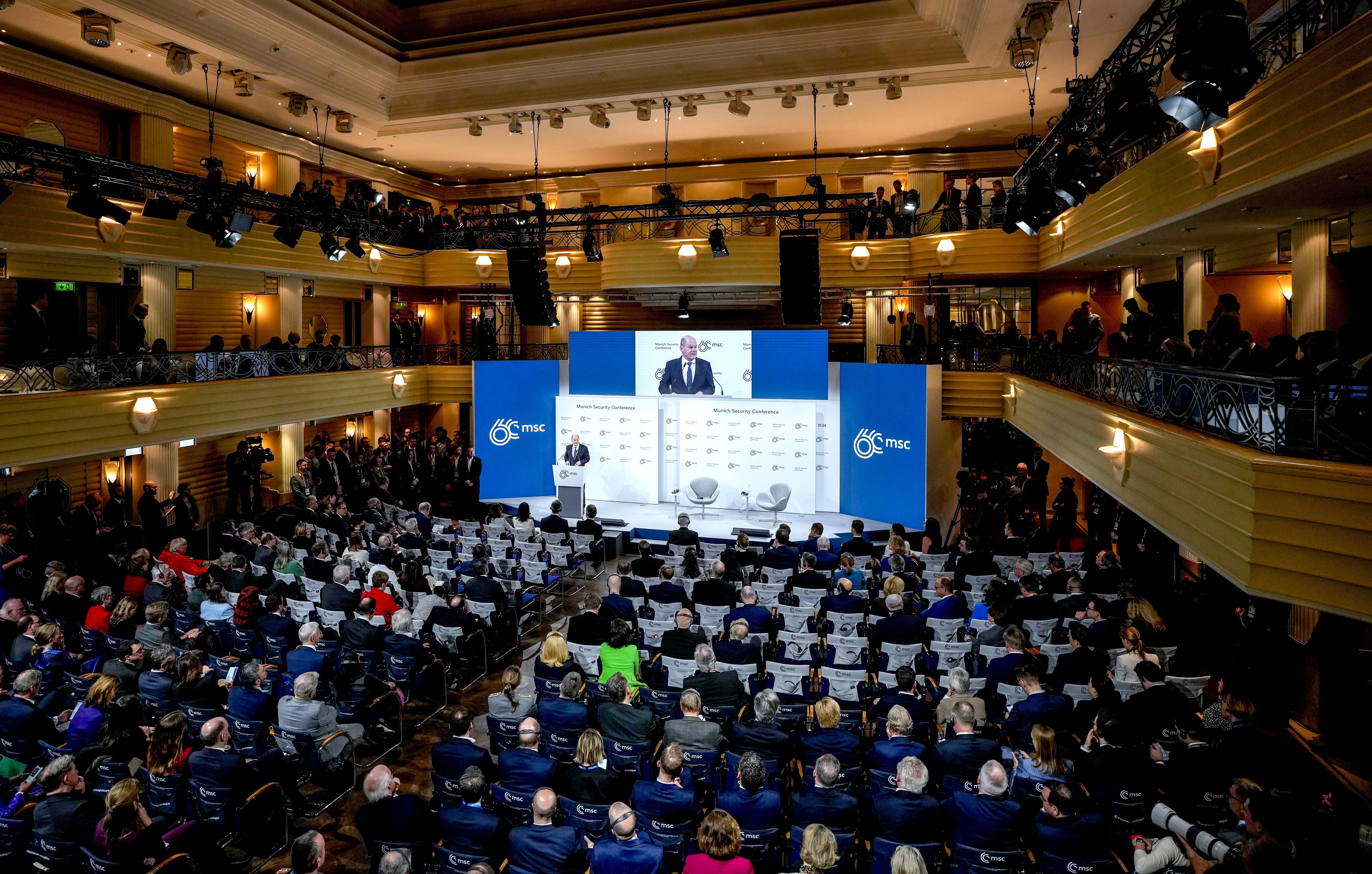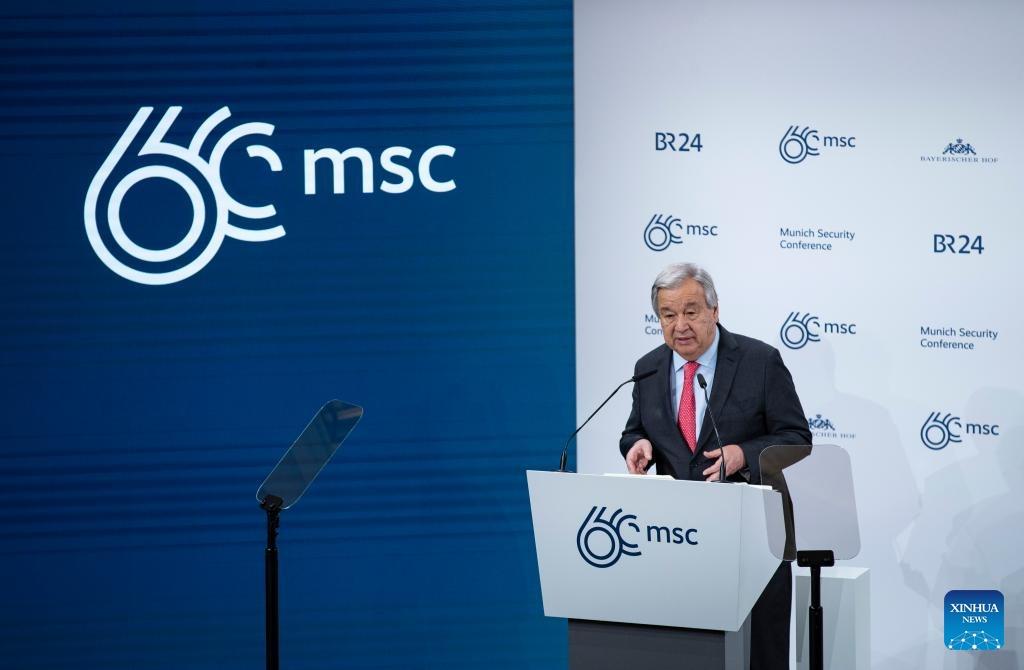 German Chancellor Olaf Scholz delivers a speech at the Munich Security Conference at the Bayerischer Hof Hotel in Munich, Germany, Feb 17, 2024. (PHOTO / AP)
German Chancellor Olaf Scholz delivers a speech at the Munich Security Conference at the Bayerischer Hof Hotel in Munich, Germany, Feb 17, 2024. (PHOTO / AP)
MUNICH – The 60th edition of the Munich Security Conference wrapped up its three-day gathering here on Sunday, with participants calling for enhanced international cooperation to address the world's pressing challenges.
Decision-makers and world elites engaged in productive discussions on enhancing the global system, ensuring that all stakeholders benefit more equitably. They agreed that promoting positive-sum cooperation is crucial as no country can remain immune to global challenges and risks, such as climate change, regional conflicts, and artificial intelligence.
Lose-lose anxiety
The MSC was born as a venue for dialogue among allied countries in the West in 1963 and thus has been dubbed a "transatlantic family meeting". Although the circle of participants has grown over the years, the "Davos of Defense" still adopts a Western-centric mentality.
Global governance in its present form is entrenching divisions and fueling discontent.
Antonio Guterres, Secretary-General, United Nations
This year's motto for the MSC, "lose-lose," which was put forward in the 2024 Munich Security Report, sums up the prevailing and conspicuous mindset of the West – facing a volatile global situation and changing geopolitical environment, governments seek to "de-risk" and prioritize "relative gains."
The mentality of prioritizing relative payoffs may spur "lose-lose dynamics" of inter-governmental interactions while jeopardizing cooperation and undermining the international order, thus creating a vicious cycle, the report noted.
Experts noted that the "pessimism" of these Western countries reflects their anxiety in a turbulent world. Ongoing regional conflicts, including the Ukraine crisis and the Israel-Hamas conflict and their spill-over economic effects, have increased their insecurity. At the same time, the development of new entrants in the international order and the multi-layered challenges of Western society have made it hard for the West to sustain its prioritized position.
READ MORE: Munich Security Conference opens with focus on global order
Cui Hongjian, a professor at Academy of Regional and Global Governance at Beijing Foreign Studies University and the deputy director of Chinese Association for European Studies, emphasized the need for a mindset recalibration, particularly regarding the West's perception of the global order if it adopts the "lose-lose" model.
Noting the anxiety of developed countries in the West, the Munich Security Report also pointed to the dissatisfaction of developing countries in the Global South for not receiving their due benefits.
 United Nations Secretary-General Antonio Guterres speaks during the opening of the 60th Munich Security Conference in Munich, Germany, Feb 16, 2024. (PHOTO / XINHUA)
United Nations Secretary-General Antonio Guterres speaks during the opening of the 60th Munich Security Conference in Munich, Germany, Feb 16, 2024. (PHOTO / XINHUA)
On the conference's opening day, United Nations Secretary-General Antonio Guterres said in his opening speech that the global community is "more fragmented and divided than at any time during the past 75 years".
"Global governance in its present form is entrenching divisions and fueling discontent," he said.
China's view
China's views drew wide attention at the conference.
The West believes that allowing developing countries to reap more means they will get less, said Sun Chenghao, a fellow at the Center for International Security and Strategy, Tsinghua University.
According to Sun, the West focuses on distribution instead of growing the pie, creating a "lose-lose" situation.
Sun said Chinese proposals, such as the Global Development Initiative, the Global Security Initiative, the Global Civilization Initiative, and the Belt and Road Initiative, consider all parties' needs, strengthening the existing international order.
Former Chinese Vice Foreign Minister Fu Ying stated at the MSC that China is against forming exclusive multilateral security mechanisms in Asia. This is not only because these mechanisms are directed toward China but also because they are incompatible with the concept of common security and threaten regional stability.
ALSO READ: Wang calls on Germany to boost mutual trust with China
China respects the sovereignty and territorial integrity of all countries and attaches importance to their legitimate security concerns. Fu stressed that it insists on peacefully resolving disputes and conflicts through dialogue and consultation.
"This is also recognized by most countries in Asia," she noted.

Chinese Foreign Minister Wang Yi, also a member of the Political Bureau of the Communist Party of China Central Committee, delivers a keynote speech entitled "Firmly acting as a force for stability in a turbulent world" during the "China in the World" session at the ongoing Munich Security Conference in Munich, Germany, Feb 17, 2024. (PHOTO / XINHUA)
Solidarity to benefit all
"If we do something really stupid, we could have been lose-lose," Graham Allison, a professor at Harvard University's Kennedy School of Government, told Xinhua.
He said that all parties should cooperate to establish a framework to make an unsolvable problem manageable.
MSC Chairman Christoph Heusgen made similar remarks in his opening address for the conference.
"Many of these (global security) challenges are man-made, which means they can be changed by men and women," he said on Friday, calling for a "silver lining" amid the "doom and gloom" of the global situation.
The Global South, which has become an increasingly important part of the security discussions in Munich in recent years, also called for enhanced cooperation and collaboration.
Something is "fundamentally wrong" with the system that does not provide an occasion for the Global South to talk, said Mia Mottley, prime minister of Barbados, during the conference.
"It can't be the voice of one or two in speeches or conferences such as this, and what the global system misses is an effective mechanism for decision-making," she stressed.
She called for enhanced international collaboration in climate change governance while urging wealthier nations to act more assertively.
Noting that multipolarity has created significant opportunities for balance and justice, Guterres on Friday stressed that a global order that works for everyone must address the gaps and provide solutions.
"We must work based on justice, with renewed urgency and solidarity," he said. "A safer world – and a bigger pie – for all."


